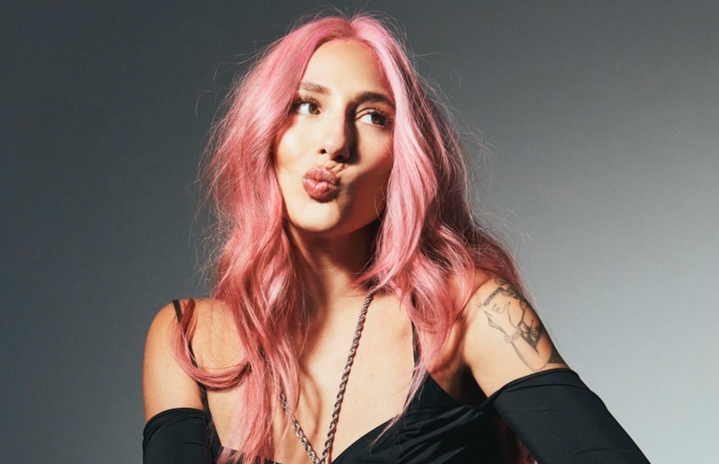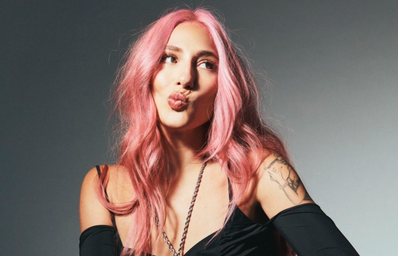How comfortable are you talking about mental health? The truth is, most of us are not comfortable. Her Campus at UCLA was lucky enough to interview Tefi Pessoa, a Latinx social media influencer who goes by the TikTok and Instagram handle @hellotefi. Below, Tefi opens up about her experience with mental illness, how she is recovering, and the role of social media in fueling the discussion of mental health.
Her Campus at UCLA: Please tell us about yourself.
Tefi Pessoa: My name is Tefi Pessoa. I am from Miami. I am a content creator and I live in Brooklyn. I talk a lot about pop culture, mental health, dating, and confidence. I am also a host for InStyle magazine and a radio show for an Amazon-owned app called Amp. I’m also a proud Cancer!
HC: You blew up on TikTok from the beginning of the 2020 pandemic when TikTok was still a new platform. What do you think was the key to your success?
TP: I think it was good timing. At the time, I was hosting a pop culture live YouTube show and working from 7 a.m. to 2 p.m. With the pandemic, the show stopped. I finally had the time to go on TikTok, the new platform. But I also didn’t want to lose an audience that I had worked so hard to build. So it was a small audience at first, but I started uploading on TikTok a lot.
HC: I see, it was the pandemic that led to your transition from YouTube to TikTok! Your TikTok seems to have a wide variety but how do you get inspiration for all your TikTok videos?
TP: Choosing what to talk about always came easy for me. But I have one rule: I will never change. If I want to do it, do it. If I want to talk about it, that means that other people probably want to talk about it too… hopefully it lands on their Explore page. Hopefully, people will share it. But if I want to talk about it, then I am going to talk about it. Remember that people want to listen to you. The moment you start making your content about other people and what they want, you lose yourself.
HC: Other than TikTok, you had your own pop culture show on YouTube and you are a pop culture expert. What made you interested in pop culture?
TP: From my early teens, I was lonely and was always trying to figure out what to talk with people about. By the time I turned 15, I was going through depression. It seemed like everything was out of control. But during this time was when my interest in pop culture sparked. I learned who to trust by alluding to a celebrity’s mental health issues and seeing their reaction. For example, when I tell someone that Selena Gomez went to rehab for depression and anxiety and they are understanding of that, I trust that person to open up about my depression as well. But if someone says something along the lines of “Selena Gomez can’t get depression because she has everything,” then I don’t trust that person. So alluding to pop culture helped me learn who to trust and who to not trust.
HC: As a public figure yourself, you must have dealt with some negative comments on social media. How do you deal with this negativity?
TP: The secret is that I don’t deal with them anymore! There’s always going to be somebody who doesn’t like you or who doesn’t vibe with you. This is the same for the real world too. When you’re working towards a goal, the negative comments don’t matter. And even if you feel hurt, it only means that you’re a human. Am I preaching too much? (laughs)
Also, the more I talked about pop culture, the more empathy I started to feel. Even if the celebrity is very privileged or wealthy, that person is still experiencing real things, like the death of a parent! That’s just life.
HC: So you use social media as a way to open up and destigmatize mental illness?
TP: Yes, I think social media can be a positive thing in this way. They bring in more nuance to news stories than mainstream media so they can capture mental illness in a more realistic light.
When I look at blogs and Twitter, I would see people there arguing for the truth. For example, when Britney Spears locked herself in the bathroom with her child, the paparazzi said that she was an unfit mother. But later on, we [found out] from all the tweets that Britney actually locked herself up because her father was threatening to take her child away. If it wasn’t for social media today in 2022, how would we have remembered Britney Spears?
HC: True, social media is sometimes important for revealing those truths. But I can imagine it’s hard to love your body when you are exposed to photoshopped bikini pictures on Instagram—how do you do it?
TP: I actually don’t love my body! I’ve really struggled… I had a pretty bad eating disorder in my teens and early 20s. And I went to rehab for it.
In rehab, I met these 16- and 17-year-olds who were complaining about being ugly! But they were so f*cking cute! And then I realized, “how come I am willing to think that of them but not for me?” That was when I started to believe in body neutrality. Body neutrality is the mindset of grounding yourself and learning how to thank each body part for its functions. I touch my legs and I say, “I’m grateful for my legs because they help me walk, dance with friends and run to my boyfriend or mom at the airport.” I touch my belly and say, “I’m grateful for my belly because it helps me digest food.” I can’t promote body positivity because it’s so hard. Look, Bella Hadid doesn’t even like the way she looks!
A lot of people see me as a strong force in body neutrality. But you have to know that I’m not doing it for the current me. I’m doing it for the 15-year-old me who I want to defend — the beautiful little girl I was very mean to.
HC: That’s beautiful. What’s a routine you have to take care of your mental health?
TP: I meditate nearly every day for at least 20 minutes. Some people say that they can’t meditate because there [are] so many distractions. But you can meditate! It just takes discipline, and you’d be surprised how far you can go. The more that you don’t sit with your feelings and the more you learn how to push them away.
I also go back to my bedroom and pretend to talk to a 15-year-old me. I say, “Dude, you won’t believe what I did today!” And she’s like, “What?” Then I tell her everything. When I’m done, I come back and live my life. So when something cool happens, I try to celebrate it with the person that didn’t give up on me. She’s been dreaming about me her whole life. If she asked me, “Are you happy?” and I say no, she’s like, “Damn, then what the f*ck are we doing?” I owe it to her.
HC: From the 15-year-old you to the current you, what is one lesson you learned about dating and relationships?
TP: I used to think that loving someone meant loving them at their worst and sticking to them. I think as a young woman I was trained to show people immediately what kind of wife I can be so that we can raise children one day. But one day, I started to question this. What if I decided that I don’t have to teach somebody how to love me? What if I can choose what to put my energy into? If I have a rude boyfriend, I can either put my energy into resolving this issue or decide that he’s not worth that energy.
The moment you realize that you can learn how to deal with your own feelings, you don’t have to look to other people to tell you how you should feel about yourself. If the guy doesn’t call, you don’t have to have a terrible night and cry. Why do you need this guy to call you so much? You have to decide what’s important to you.
HC: Knowing yourself seems to be important in a relationship. I feel like this also relates to the fact that you are so confident about and open about your plastic surgery.
TF: I’ve had Botox and filler and I’m getting a nose job in May. I’m just sick and tired of getting my nose filler in the middle of the day and interrupting work! If I know that I like my nose like this, it’s better to just get it done at that point. I have never felt ashamed about it because I know that’s best for me… The last thing I’m going to do is manipulate people into thinking that my nose comes naturally to me. And let me tell you something — if I spend money on it, I want you to see it. A nose job is not cheap in New York, baby.
I tried very hard to love the way that I was born. But I know I feel better when I look like this and I feel like that’s okay. Spending a little money on things like Botox is not [that] big of a deal. I also don’t have the energy for secrets.
HC: In 2021, you won TikTok’s nomination for the Latinx Trailblazer in the Creator Spotlight Series during Hispanic Heritage Month. What does this nomination mean to you and what do you think it means to the Latinx community?
TP: I can talk to you a bit in Spanish but I mess up the verbs and conjugations. I think this shows that culture is so much more than language. Culture is the way we love people, the way we laugh, the way that we celebrate our food, the way we get our food, the way that we dance, the way that we date… culture is so much more than verbs! We share the same blood and you cannot take away blood. I feel like my identity of being Latino or Latinx is constantly changing. But I always try to remember that I’m important because there’s no way my ancestors fought so hard to survive for us. My life is important.
Getting to interview Tefi was truly inspirational! I have never met anyone who is so open about herself and willing to give so much life advice. Her wicked sense of humor also made me laugh so much during the interview. I wish Tefi the best of luck in her career!


